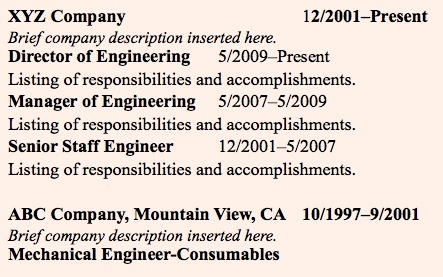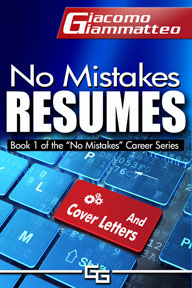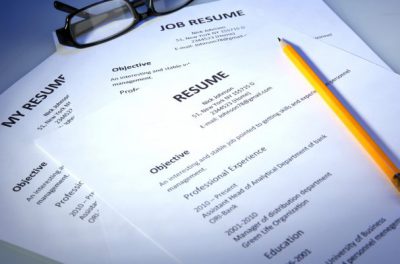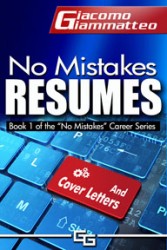We’re going to talk about the dates on your resume. Many of the problems I see with resumes stems from people not knowing what to do and how to list them. Near the end we’ll get to the big question—should you include months on a resume?
Dates
I like talking about nothing more than dates. I don’t mean the kind we had as teenagers or the kind you eat; I mean the dates on a resume. Why? Because this is where people seem to go hopelessly awry. The sad thing is that this is the easiest part of the resume to get right. All you have to do is learn where to put them—and, tell the truth.
Dates on a resume are like olive forks; there is no special slot for them in the silverware drawer. There are options:
- You could put them with the iced-tea spoons.
- Or with the espresso spoons.
- You could even squeeze them in with the cocktail/shrimp forks.
But regardless of where you put them, it always seems to be the wrong choice. That’s because you have options. Having options confuses us, especially when it comes to resumes.
Questions I Get Asked About Dates
- Do I put them in the left margin?
- Do I put them on the same line as the company, but to the right?
- Do I right-justify the date?
- How about after each position if there are more than one in a company?
- Do I include the months or just the years?
- Do I spell out the months? Or use numbers?
- Do I include days?
- How do I handle gaps in employment?
Fortunately for you, I’m here to take away many of your options.
If you don’t align the dates properly, they can be confusing. I prefer the dates of each position to be offset from the dates at each company, like this:
See how clean this looks, and how easy it is for the gatekeeper to glance at the resume and see the progression? Also note that this resume uses numbers for months, and that the dates following each position are in regular font, not bold. You want the dates for the companies to stand out and to be aligned. The dates for each position should be offset and unobtrusive. I have seen people do resumes with the dates on the left margin—and it looks good—but it devours valuable space. I prefer this option.
Gaps
Let’s talk about gaps in the work history. This person left ABC in 9/2001 and didn’t start at XYZ until 12/2001. Many people would cover up the gap by listing years only. This person did it the right way. If you have a gap—leave it. Show it. Shout it out. It will earn you a red flag, but just one, and you can explain the gap to the gatekeeper when you get the interview. (Remember—along with the red flag, you also earn bonus points for being honest. Trust me; that goes a long way toward getting you the interview.)
Lying has no place in the resume, and resumes are where the lies usually rear their ugly heads, especially about dates. I’ve seen people leave out jobs, leave off dates, fudge dates, and outright lie about dates. Besides being just not right, when you lie about dates, it’s too easy to get caught. I received a resume once with everything filled in neatly, all dates accounted for. I did some checking on Linked-in to see who else I knew that might have worked with this person, and I saw a recommendation from a person who said “worked with Bob at XYZ Company.” I was puzzled. Bob’s resume didn’t show employment at XYZ Company. I did some digging, and, sure enough, Bob was at XYZ for about six months. He just “forgot” to mention it on his resume.
Needless to say, I didn’t represent Bob. The sad thing is—and I checked this—his tenure at XYZ wasn’t bad. He didn’t get fired. He did nothing wrong. It was just one of those circumstances that didn’t work out. Perfectly explainable to a prospective employer. Instead, Bob chose to hide it, and it cost him a shot at a good job.
Should You Include Months on a Resume
You should always list the months you worked—not just years.
Many resumes list years only, not months. I know a lot of that comes from bad advice, and I hope that’s the primary reason. But in case you’re still thinking about it, read the statement below.
Then read it again.
If you don’t put months on your dates of employment, you are guilty until proven innocent.
Every gatekeeper and every headhunter I know gets suspicious when they see only years listed on a resume. If your resume shows 1997–2001, and then 2001 to present, the first thing I think is, “Did they leave in January 2001 and start the other job the following December?” It might be wrong to think like that, but it’s a fact of life that gatekeepers do. If you don’t put the months down, you’re assumed guilty. Period. End of discussion. Resume trashed.
The Bottom Line
- Have your dates aligned, preferably to the far right.
- Show the dates you spent at each company in bold.
- Show the dates after each position offset to the left, not bold.
- Do not fudge on dates. Show both month and year on each one.
- Show any gaps in employment. Be prepared to explain those gaps, but do not try to cover them up.
If you liked this post, please share. And you might consider checking out my book No Mistakes Resumes. You can buy it here, or almost anywhere online. If you really need help, consider our resume services.























Thanks for listing out the importance of dates in a resume .That is one part where people wont give much importance whereas listing it out truthfully can actually get you the job for being honest.Great article!
Twitter: JimGiammatteo
says:
I agree, George. More than once, I gave a person a second shot because of this factor alone.
Jim
I think the concept is rather silly. I’m doing a resume for my friend so I googled it. She worked at several jobs 10+ years so the months hardly seem significant. I’m going to add them back in but the concept seems outdated unless you stayed at a job for just a few months or a year or two
Twitter: JimGiammatteo
says:
Thanks for the comment, Helen. You’re right, but that doesn’t change anything. Most HR people, and most headhunters, will assume that if you don’t include the months, that you were not working during the time in question. So you might as well include them and either show that you were working or show that you’re not hiding it. Either way is preferable to non-inclusion.
Giacomo
Do you suggest date ranges on resumes? I am still in school and have only put the date of graduation for the education portion of my resume, should i do the same and only include the end month on my resume for past experience or should i do a range (ex. Jan-Aug 2016)?
thank you
Twitter: JimGiammatteo
says:
putting only the end date for education is fine. Such as University of X — 2014. But for work history do the range, such as: XYZ Co. August 2012–July 2017
Thanks for the great, free, advice or knowledge it is much appreciated
I’ve worked on same job for 25 years. I have it 3 times throughout resume, is this wrong & what should I put?
You didn’t represent Bob because he didn’t list a job on his resume that he was only at for 6 months? This seems pretty harsh, perhaps his experience at that position wasn’t relevant to the types of jobs he was looking for. Leaving something off the resume is perfectly acceptable, especially if it is not relevant to the types of jobs the candidate is going after, and it certainly should not be considered “lying”.
Twitter: JimGiammatteo
says:
I chose not to represent him not because he left his job, but because he lied about it. And yes, in my book, not mentioning you were employed for six months, relevant or not, is lying.
I have to agree with Jason on this one G! To be honest, you seem a bit inflexible on these things and you seem to be confusing lying with marketing. You don’t see McD’s showing x-rays of the patients clogged arteries that eat their food in their marketing campaigns/commercials, right? Is that lying?
Ex. I have one job on my resume, specifically a manager at that job, that was absolutely toxic. I leave this job on my resume, but it is something I have seriously considered removing from my resume and I wish it were like a marriage that I could have annulled because according to you experts, I can’t talk bad about a past employer, but I want to be “honest” (as you say) about what really happened, but I unfortunately cannot because it makes me look bitter and people won’t hire me. Kindof a catch 22 on this honesty thing, huh G? Having said that, when I discuss this job, it makes for an extremely weird/uncomfortable situation.
And what about functional resumes G that “spin” and present things a little different? It’s ok to leave things off in those resumes, right? So, why not normal resumes.
Bottom line, is that the employers/hiring managers and yes, even you angel recruiters don’t air out all of their dirty laundry during the interview process and they present/market themselves in a favorable light, so we, the candidates, have the exact same right to do the exact same things and present ourselves in the most favorable manner possible!
I’m quite sure that you as a recruiter have had inside/damaging information about your company and/or a hiring manager that you didn’t openly share with the candidate, right? There is no doubt that has happened with you in the past, right? So, for you to call someone a liar for doing the exact same thing, i.e. marketing themselves in the best light possible and then you not choosing to represent them seems like a “holier than thou”, judgmental and a “moral authority” type situation to me. Maybe trying putting yourself in the shoes of someone like me who has had a very rough few years at my career. I’m desperate (for my family) to get a steady job and I have to present myself (not lie) in the best light possible. Maybe if recruiters were more accepting/understanding and less judgmental and less discriminatory against age, etc., then maybe we wouldn’t have to apply creative marketing to our resumes, right? Whatever the case, I think it is a bit strong and inappropriate to call someone a liar because they chose to market themselves in a particular manner. The resume is a marketing tool and it is my discretion as the owner to decide how/what I want to present as long as the information in it is accurate and not false. Just my $0.02!
Had the same thought when I read your article. You were wrong in this situation. I don’t list jobs I feel are irrelevant.
Twitter: JimGiammatteo
says:
Thanks for commenting. I understand your thoughts, and there are many people that agree, but I don’t. I feel that all work history should be listed. Presuming you get the interview, you can explain it there.
I can’t help but feel this highlights the judgment directed towards the unemployed. Like it’s something to be ashamed of, or that it makes you less valuable. Something to be explained and defended, or else hidden. Why wouldn’t the odd break be expected, or irrelevant?
If I had sevaral jobs atcthecsame time , how I should write it in my resume?
For example: Teaching , and diing urban planning atcthe same time
Twitter: bethzybrown
says:
Thank you for sharing, keep bringing more
My last job ended on 27 January 2018, is it acceptable, at the date of employment section for me to say May 2017-February 2018 (I rounded up the days).
Kindly advice. Thank you.
Twitter: JimGiammatteo
says:
Sorry I didn’t see this earlier. You could do it that way, but why? You have an opportunity to earn bonus points by being honest if you list it as January, then in a cover letter or interview, mention the date. But I doubt anyone will fault you if you wanted to skip the three-day gap.